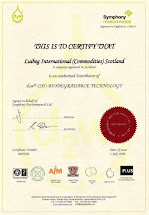Aloha! We can clear up the Great Pacific Garbage Patch
Michael Stephen, deputy chairman of Symphony Environmental, explains how he can bring back Hawaii’s golden sands
ONCE a five-mile stretch of golden sand, Kamilo beach on the island of Hawaii has become a huge rubbish dump of carrier bags, cigarette lighters, broken toys and other discarded plastic that scars the landscape and could cause lasting damage to the environment.
A British company is aiming to make such detritus a thing of the past. Symphony Environmental has created a substance that can be added to plastic materials to speed up their degradation time from several decades to just a few months.
“We call it superfast biodegradation. All plastic will eventually biodegrade but our technology dramatically accelerates the process,” said Michael Stephen, deputy chairman of Symphony.
The litter that washes up on Kamilo mostly comes from the Great Pacific Garbage Patch, an area of the ocean estimated by some to be twice the size of Texas, where 100m tonnes of floating plastic rubbish poses a threat to thousands of marine animals.
Symphony, based in Borehamwood, Hertfordshire, claims most plastic made with its technology would degrade before it ever reached that part of the world.
The special additive, called d2w, is put into plastic products when they are being manufactured. It works by weakening the carbon bonds, lowering the material’s molecular weight and eventually causing a loss of strength. The plastic can be given a set lifespan, depending on what purpose it is ultimately intended for.
“The point of this is that a bin liner, for example, may require a useful life of 18 months before beginning to lose its strength, whereas a bread bag may require only a few weeks,” said Stephen.
It has been a fight to get the company where it is today.
Founded in 1995, it began creating the technology in partnership with EPI, the environmental products group, in 1998. Their agreement was scrapped in 2003 and EPI tried in the High Court to prevent Symphony going it alone. The claims were dismissed, leaving Symphony free to market and develop its technology.
The recent switch to a licensing model has helped the AIM-listed business make a small profit for the first time. The d2w logo now appears on plastic packaging in 70 countries for companies including Sony and Nokia. In Britain, Barclays, Tesco and JD Sports use Symphony products.
The company has faced stern opposition from rivals. The plastics industry is split into two camps — those that back “oxo-biodegradable” products, such as the d2w range, which break down with exposure to air alone; and those that back “bio-degradable” goods, which rely on specific conditions, such as burial in the ground, to kick-start the process.
“It has been a vicious war and sadly in some cases the bio-producers have convinced British farmers that crop-based plastics are best,” said Stephen. “That is wrong, though, because when they are recycled they give off methane [a potent greenhouse gas].”
He said Symphony is working on a superfast version of its technology that will allow plastics to degrade in less than a month.
Sunday, 7 March 2010
Subscribe to:
Post Comments (Atom)



No comments:
Post a Comment